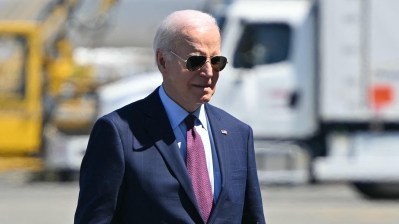
Auto workers union drive heads south

After going on strike and securing lucrative new contracts with GM, Ford and Stellantis last fall, the United Auto Workers union, under new president Shawn Fain, recently scored a major win in the South and is hoping to build on that momentum.
In late April, 73% of the 4,300 production workers at a Volkswagen plant in Chattanooga, Tennessee, voted to join the UAW and authorize it to enter into collective bargaining with their German employer. Two previous union drives there had failed.
It’s a signal victory in the UAW’s $40 million campaign to organize approximately 150,000 workers at foreign-owned, nonunion automakers across the South, including BMW, Honda, Hyundai, Mazda, Mercedes, Nissan, Subaru, Toyota, Volkswagen and Volvo, as well as domestic electric vehicle makers Lucid, Rivian and Tesla.
The UAW’s next test will be a union vote at two massive Mercedes-Benz plants near Tuscaloosa, Alabama. It’s a right-to-work state in the Deep South, where low taxes and labor costs are touted to potential employers as a benefit. Not a surprise that historically, the state has been hostile to unions.
But some of that may be changing.
At the sprawling Barber Motorsports Park on the outskirts of Birmingham, a huge crowd packed the bleachers and lawns at the Children’s of Alabama Indy Grand Prix. It was a sunny Sunday on the last weekend in April.
After a solemn singing of the national anthem, an announcement boomed from the jumbotron screens along the 2.38-mile track: “It’s time for those most famous words in all of sports. … Drivers, start your engines!”
As the IndyCars began zooming around the track — they do 90 laps, a total of 207 miles — some spectators noticed something going on above. A small airplane circled for several hours, pulling a banner that read: “SUPPORT AUTO WORKERS — UNIONSOLIDARITY.US”
The message, paid for by More Perfect Union, a pro-labor group that supports union organizing across the region, was meant to build awareness and momentum for UAW organizing in Alabama. The aerial banner had also been flown over a public event in Tuscaloosa the previous day.
Specifically, the stunt was aimed at urging thousands of Mercedes-Benz workers in central Alabama to vote yes in their union election May 13 through May 17, overseen by the National Labor Relations Board; to join the United Auto Workers; and to help spread unionization across the South.
IndyCar fan Scott Taylor, taking a break from watching the race, said he isn’t a fan of the UAW. “The reason Mercedes came to Alabama was because there wasn’t a union,” he said. “If you make yourself the same price as the guys in Detroit, you’re gonna drive Mercedes out of here.”
But the UAW also had supporters in the crowd. Carlton Vaughn was shopping the vendor tents for IndyCar merch with two friends. “Unions in America have been not looked at in a good light, and that’s part of a bigger issue,” he said. “If you want people who are going to get behind your cause and you’re a union worker in the automotive industry, the race is the way to do it. I’m down. I’m going to check out the website and see what’s going on.”
About half an hour west of Birmingham along Interstate 20 is Mercedes-Benz’s giant production complex, encompassing two huge factories, the company’s U.S. headquarters, test tracks and other facilities. It’s located in the tiny town of Vance, Alabama, on 1,000 acres of rolling hills in a sparsely populated rural area about 20 miles east of Tuscaloosa, which is home to the University of Alabama.

The land was gifted to Mercedes-Benz U.S. International, or MBUSI, in the early 1990s. Mercedes has invested as much as $7 billion since then to develop and expand the site, which is the company’s U.S. production hub for luxury SUVs and electric batteries.
The company employs about 5,200 production workers, who earn some of the highest blue-collar wages in the state.
“From where I’m from, Mercedes seemed like the ideal job,” said Moesha Chandler, 24, who grew up in the small rural community of Uniontown, about an hour away. “They paid well, so much better benefits.”

Two weeks before the historic unionization vote at MBUSI, Chandler was at UAW Local 112, headquarters for the workers’ vote yes campaign. It’s a busy office with pro-union posters on the walls and T-shirts, hats, visors and other UAW paraphernalia piled on tables. The union hall is tucked into a strip mall flanked by a Dollar General and a Family Dollar store, along a two-lane highway a few miles from the main Mercedes plant.
Chandler makes $24.50 an hour as an assembly worker after being at Mercedes for a year. (For the first six months, she was a temp working for a contractor.) She said the pay is better than most jobs in local manufacturing. But the work is hard, and she struggles to make ends meet living in Tuscaloosa, a college town where rents are high for the region.
“The work is definitely something to get used to,” she said. “It never really gets better, you just adapt to it. It’s extremely tiring. Some nights I have to fight with myself to just get in the shower and make sure I put food in my body.
“I’m not too much of a picky worker,” Chandler continued. “I know I didn’t come to work at a cupcake factory. But I do feel like I should be properly compensated — especially from the wear and tear that it causes on your body. ”
Chandler takes inspiration from her brother, a union autoworker at Ford in Michigan, who just got a big raise under the UAW’s new contract. “When he talks about all the great things the UAW has done for them,” Chandler said, “I figure we deserve that just like they do. So I’ve really pushed hard to start unionizing.”

Mercedes worker Jay White, 56, lives in a comfortable ranch home with a pool out back in the small town of Brent, Alabama, about 20 miles from the plant. White said he’s doing just fine without the UAW. “We work in a facility that’s air-conditioned and heated, as clean as we can keep it,” he said. “We are not abused, we are not pulling fresh lumber off the green chain, laying asphalt in 120-degree weather. We have a very nice job.”
White is active in the MBUSI Workers Information Committee, a group that urges fellow workers to vote no on unionizing. Its homepage says: “This group was formed to educate employees about the radical and self-serving agenda of the UAW. Help us spread the word that the Union is not needed at Mercedes!” White posts material online and distributes paraphernalia like anti-UAW hats at the plant.
He makes the top wage at Mercedes, $34 an hour — before a team leader premium and a shift differential for his nighttime work schedule. And with Alabama’s low cost of living, he said, he’s doing as well as UAW workers in the North.
“Intellectually, I don’t agree with the way the union operates today,” White said. “We recognize individual responsibility. That’s why we’re a right-to-work state.”
Which contributes to the anti-union environment in Alabama. Gallup, which tracks labor unions’ popularity in the U.S., recently found that 67% of people in the South disapprove of unions. In the rest of the country, it’s slightly less than 50%.
The company also has a website opposing the UAW. And managers have been showing vote-no videos to workers in the plants. One, titled “What do unions cost?” included this messaging: “Strikes can make really good headlines for unions. But there is another side to them they don’t always talk about. During a strike, employees don’t get paid by their employer. And in the state of Alabama, striking employees don’t get unemployment. . . . So the next time someone asks you to vote for the union, make sure to ask them to put in writing what you’ll get in return. And if you don’t want the union, vote no the week of May 13th.”
According to the NLRB’s press office, the agency is currently investigating four UAW complaints of unfair labor practices in the latest organizing campaign: “alleging Mercedes unlawfully fired three employees for engaging in protected activities, imposed discipline on employees for discussing unionization at work, and prohibited the distribution of union materials and paraphernalia at its Vance, AL facility.”
Mercedes-Benz did not respond to questions in time for Marketplace’s deadline.
Meanwhile, Republican political and business leaders in Alabama have warned that unionization could drive major employers out. After six Republican governors of Southern states (Tennessee, Alabama, Georgia, Mississippi, South Carolina and Texas) issued a joint statement opposing the UAW’s union drive at the Volkswagen plant in Chattanooga, Tennessee, Alabama Gov. Kay Ivey posted this on X:
Leaders of the Business Council of Alabama are also inveighing against an expansion of unionization. Executive Vice President Clay Scofield, a Republican who just left the state Senate after serving for 13 years, wrote this for the group’s website: “Like a manufacturing tidal wave, Toyota Mazda, Honda, and Hyundai each built large and impressive facilities in Alabama, but just as a tide comes in, it can also quickly recede if the labor unions are successful in planting roots here.”
Mercedes worker and union drive leader Jeremy Kimbrell, who has 24 years’ tenure at MBUSI, said managers are warning workers of similar dire consequences if the union is voted in. For instance, that their jobs will be shipped to Mexico. But he’s not buying it.
“To build what we already have in Vance, Alabama, at a new location,” Kimbrell said, “I feel confident $6 billion to $8 billion is what it would take.”
University of Alabama labor economist Peter Brummund thinks the notion that Mercedes and other major manufacturers will exit the state — after putting down roots because of Alabama’s favorable business climate, tax incentives and inexpensive land and labor — is far-fetched, at least in the short term.
“Mercedes has been here for a long time,” Brummund said. “The other manufacturers have made significant investments in their plants here in Alabama. It’s going to be hard for them to leave.”
Unions have suffered multiple organizing failures in the South. Jeremy Kimbrell said he’s been involved in several unsuccessful attempts to unionize Mercedes-Benz in Alabama; the UAW lost two votes in Tennessee before finally winning representation this year. But this time, Brummund said, “I don’t think it’s unthinkable they can win.”
Politics favors the anti-UAW side, he added. But economics leans the other way.
“Alabama’s definitely Republican. But I think when you see similar workers making more, yeah sure, I’m going to vote Republican on those other issues, but when it comes to pay increase, that’s in your pocket,” he said.
“The strikes up in Detroit — those were definitely first and important,” Brummund continued. “But I think UAW progress being made in Tennessee, in North Carolina, opens the door more. People in Alabama see they have more of an opportunity, because it’s just next door.”
After next week’s NLRB-supervised vote at Mercedes, the UAW organizing drive has its sights set on a Hyundai plant in Montgomery, Alabama, and a Toyota facility in Troy, Missouri, where workers are already gathering signatures on union cards.
There’s a lot happening in the world. Through it all, Marketplace is here for you.
You rely on Marketplace to break down the world’s events and tell you how it affects you in a fact-based, approachable way. We rely on your financial support to keep making that possible.
Your donation today powers the independent journalism that you rely on. For just $5/month, you can help sustain Marketplace so we can keep reporting on the things that matter to you.

















